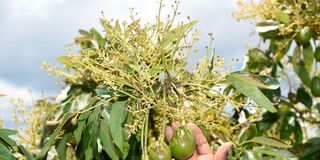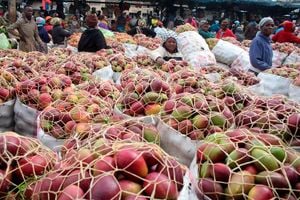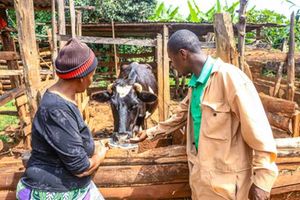Avocado farmers on path to recovery after heavy rains leave trail of destruction

An avocado farm. Most farmers who grow the fruit on large scale water the avocados through irrigation, which allows them to regulate the amount of water the plants get. This was not possible during the heavy rains, hence the damage.
What you need to know:
- The excessive rainfall decreased production during the avocados' flowering stage.
Avocado farmers in Kirinyaga and Thika are hopeful that their fruit trees, which were destroyed by the recent heavy rains, will recover in the next few months. Mr Peter Kangangi, an avocado farmer in Kirinyaga County and the secretary at Ndia Avocado Farmers' Cooperative Society Limited, noted that the excessive rainfall decreased production during the avocados' flowering stage.
"Before the rains, we had many avocados that were not yet mature. When it rained, they all fell from the trees, but we could not sell them. That reduced fruit yields. We have only delivered between four and five tonnes to the market this time round," said Mr Kangangi.
He told Climate Action that before the rains, the cooperative, which has more than 50 members, used to produce between 10 and 15 tonnes for the export market.
However, he is hopeful that they will have a better harvest in December following reduced rainfall across the country. The farmers say the fruit trees have started flowering.
"We have told our farmers to start adding organic manure to their avocado farms to support their health growth so that the next season we can have good flowering and harvest more fruits," Mr Kangangi told Clime Action.
Most farmers who grow the fruit on large scale water the avocados through irrigation, which allows them to regulate the amount of water the plants get. But this was not possible during the heavy rains, hence the damage.
"After harvesting, we limit the amount of water the avocado gets," Kefa Kiriinya, divisional manager at Kakuzi Horticulture, said.
Kakuzi Horticulture, one of the country's avocado exporters, was equally affected by the heavy rains. According to Jonathan Kipruto, the general manager at the farm, the excess rainfall affected more than 2,000 avocado trees on their farm.
"Ordinarily, the rains we receive do not cause any harm. But this year the water table came up and moisture in the ground was too high," said Mr Kipruto.
He added that avocados are highly susceptible to root rot disease, which happens when there is a lot of stagnant water.
The heavy rains affected orchards planted in flat areas, resulting in waterlogging.
In its resilience efforts, the farm performed a staghorn on areas affected by the heavy rainfall to limit stress on avocado trees. Staghorning is the cutting of parts of an avocado tree whose production has been affected to give it more time to regrow without entirely uprooting it. It is similar to pruning. With this, he is optimistic that the farm will soon increase its harvest.
"Naturally, when you do a staghorn on healthy trees, they will return with much vigour. We do have tender love and care for the trees, which means we give them more attention in terms of fertiliser rich in phosphorus to help stimulate the root growth and the tree's health in general," said Mr Kipruto.
While the main aim of staghorn in areas affected by heavy rains is to reduce the stress on the trees and revamp them, he revealed that it has its challenges. For example, the farmer loses production for one year. However, the production level increases in the subsequent seasons.
"Production will be lower, but it will continue building up, and the advantage is that you will get better quality and heavier fruits. So, we are hopeful that the areas where we have taken that remedial action will bounce back in a few months," Mr Kipruto told Climate Action.
The European Union-funded Business Environment and Export Enhancement Programme in partnership with the government aims to resolve avocados’ value chain challenges to enhance competitiveness and increase access to export markets. The initiative, implemented by Trade Mark Africa, aims to boost green economic growth in the country.





